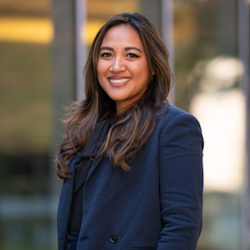Dr. Matilda Tavares

Matilda Tavares is USF’s Director of Alumni Engagement, Reunion, and Affinity. She is the facilitator of the AAPI Center’s Staff and Leadership Learning Community focusing on “Practices of Care for Multiracial AAPI Students.
Please tell us about your background, research interests, and your role(s) at USF.
I grew up in Hawai‘i in a multiracial Pilipino, Puerto Rican, and Portuguese family. I was surrounded by diverse cultures and histories, which shaped my passion for exploring identity, belonging, and racial justice. My research interests are on multiracial identity, communities, and families, and I approach this work through the lens of Critical Race Theory—examining how historical and present-day structures shape experiences of race and identity. I believe that understanding these systems is key to dismantling inequities.
At USF I am the Director of Alumni Engagement and Affinity Networks at USF, I get to help alumni stay connected with the university, our current students, and each other. My team oversees programs like our Affinity and Identity Groups, Professional Networks, and the Alumni Mentor Program. I am a USF alum myself with an MA in Organization and Leadership (2018) and EdD in International and Multicultural Education (2024).
What does identifying as AAPI mean to you?
Identifying as AAPI is, for me, a powerful reminder of the intersectional identities that shape who I am and how I show up in the world. Growing up in Hawai‘i with my multiracial background, I learned early on the beauty and complexity of respecting and navigating multiple histories, cultures, and ways of being. For me, identifying as AAPI isn’t just about celebrating heritage—it’s about a commitment to ongoing learning, advocating for social change, and being solidarity with other marginalized groups. With what feels like daily changes in our society, I feel the responsibility and weight of identifying as AAPI now more than ever. I am always reflecting on what it means to carry on the legacy of advocacy and resilience of the AAPI community today?
Tell us about the Staff and Leadership Learning Community that you are facilitating this semester. What do you hope to share and cultivate through this learning community?
This semester, I’m leading the Understanding and Supporting Multiracial-Asian and AAPI Students Staff and Leadership Learning Community. I’m grateful to be facilitating a topic that is so personal to me and to many of the staff members who identify as AAPI and multiracial that have joined us this semester.
Oftentimes multiracial identities are underrepresented or excluded in academic data and university programs. Our discussions center around the history of multiracial communities in the United States and the experiences of AAPI students that identify as multiracial and/or transracial adoptees. We are learning about the challenges students may face in a university setting as well as what spaces and experiences allow them to be their most authentic selves. Our hope is to apply what we’ve learned to our everyday work across the university and identify ways we can create a USF that is welcoming and affirming of our students' intersectional identities.
What is something you want others to know about AAPI communities?
I am so proud to say that AAPI history and identity is one of resilience and perseverance. At the same time I want others to know that AAPI history and identity is also rooted in love, joy, and hope. We see this in the warmth of shared meals, the richness of our cultures, and the deep bonds of family, friendship, and community. We also see it in a way that AAPI communities have long stood in solidarity with other marginalized groups, advocating for justice, and building bridges across different movements. While the fight for visibility and equity continues, our story is not just one of hardship but also love, joy, and hope.